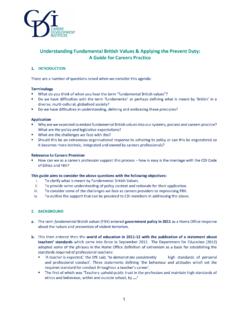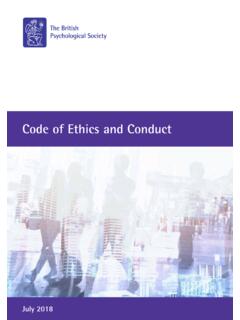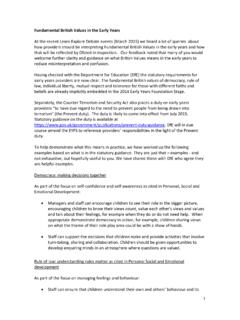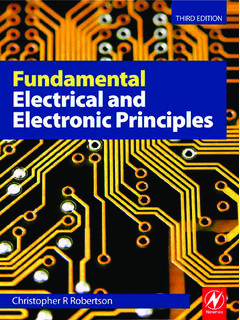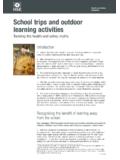Transcription of The Prevent duty - GOV.UK
1 The Prevent duty Departmental advice for schools and childcare providers June 2015. Contents Summary 3. About this departmental advice 3. Expiry or review date 3. Who is this advice for? 3. Main points 3. Introduction 4. The Prevent duty : what it means for schools and childcare providers 5. Risk assessment 5. Working in partnership 7. Staff training 7. IT policies 8. Building children's resilience to radicalisation 8. What to do if you have a concern 10. 2. Summary About this departmental advice This is departmental advice from the Department for Education. This advice is non- statutory, and has been produced to help recipients understand the implications of the Prevent duty . The Prevent duty is the duty in the Counter-Terrorism and Security Act 2015 on specified authorities, in the exercise of their functions, to have due regard to the need to Prevent people from being drawn into terrorism. Expiry or review date This advice will next be reviewed before September 2016. Who is this advice for?
2 This advice is for: Governing bodies, school leaders and school staff in maintained schools (including nursery schools), non-maintained special schools, proprietors of independent schools (including academies and free schools), alternative provision academies and 16-19 academies Management committees and staff in pupil referral units Proprietors and managers and staff in registered childcare settings It will be of particular interest to safeguarding leads. Main points The main points of this advice are to: explain what the Prevent duty means for schools and childcare providers;. make clear what schools and childcare providers should do to demonstrate compliance with the duty ; and inform schools and childcare providers about other sources of information, advice and support. 3. Introduction From 1 July 2015 all schools 1, registered early years childcare providers 2 and registered later years childcare providers 3 (referred to in this advice as childcare providers') are subject to a duty under section 26 of the Counter-Terrorism and Security Act 2015, in the exercise of their functions, to have due regard to the need to Prevent people from being drawn into terrorism.
3 This duty is known as the Prevent duty . It applies to a wide range of public-facing bodies. Bodies to which the duty applies must have regard to the statutory guidance. Paragraphs 57-76 of the guidance are concerned specifically with schools and childcare providers. This advice complements the statutory guidance and refers to other relevant guidance and advice. It is intended to help schools and childcare providers think about what they can do to protect children from the risk of radicalisation 4 and suggests how they can access support to do this. It reflects actions that many schools and childcare providers will already be taking to protect children from this risk. 1. Including early years and later years childcare provision in schools that is exempt from registration under the Childcare Act 2006. 2. Those registered under Chapter 2 or 2A of Part 3 of the Childcare Act 2006, including childminders. 3. Those registered under Chapter 3 or 3A of Part 3 of the Childcare Act 2006, including childminders.
4 4. Radicalisation refers to the process by which a person comes to support terrorism and forms of extremism leading to terrorism. During that process it is possible to intervene to Prevent vulnerable people being drawn into terrorist-related activity. 4. The Prevent duty : what it means for schools and childcare providers In order for schools and childcare providers to fulfil the Prevent duty , it is essential that staff are able to identify children who may be vulnerable to radicalisation, and know what to do when they are identified. Protecting children from the risk of radicalisation should be seen as part of schools' and childcare providers' wider safeguarding duties, and is similar in nature to protecting children from other harms ( drugs, gangs, neglect, sexual exploitation), whether these come from within their family or are the product of outside influences. Schools and childcare providers can also build pupils' resilience to radicalisation by promoting fundamental british values and enabling them to challenge extremist 5 views.
5 It is important to emphasise that the Prevent duty is not intended to stop pupils debating controversial issues. On the contrary, schools should provide a safe space in which children, young people and staff can understand the risks associated with terrorism and develop the knowledge and skills to be able to challenge extremist arguments. For early years childcare providers, the statutory framework for the Early Years Foundation Stage sets standards for learning, development and care for children from 0-5, thereby assisting their personal, social and emotional development and understanding of the world. The Prevent duty is entirely consistent with schools' and childcare providers' existing responsibilities and should not be burdensome. Ofsted's revised common inspection framework for education, skills and early years, which comes into effect from 1. September 2015, makes specific reference to the need to have safeguarding arrangements to promote pupils' welfare and Prevent radicalisation and extremism.
6 The associated handbooks for inspectors set out the expectations for different settings. The common inspection framework and handbooks are available on The statutory guidance on the Prevent duty summarises the requirements on schools and childcare providers in terms of four general themes: risk assessment, working in partnership, staff training and IT policies. This advice focuses on those four themes. Risk assessment The statutory guidance makes clear that schools and childcare providers are expected to assess the risk of children being drawn into terrorism, including support for extremist ideas that are part of terrorist ideology. This means being able to demonstrate both a general understanding of the risks affecting children and young people in the area and a 5. Extremism is vocal or active opposition to fundamental british values, including democracy, the rule of law, individual liberty and mutual respect and tolerance of different faiths and beliefs. We also include in our definition of extremism calls for the death of members of our armed forces, whether in this country or overseas.
7 Terrorist groups very often draw on extremist ideas developed by extremist organisations. 5. specific understanding of how to identify individual children who may be at risk of radicalisation and what to do to support them. The general risks affecting children and young people may vary from area to area, and according to their age. Schools and childcare providers are in an important position to identify risks within a given local context. It is important that schools and childcare providers understand these risks so that they can respond in an appropriate and proportionate way. At the same time schools and childcare providers should be aware of the increased risk of online radicalisation, as terrorist organisations such as ISIL seek to radicalise young people through the use of social media and the internet. The local authority and local police will be able to provide contextual information to help schools and childcare providers understand the risks in their areas. There is no single way of identifying an individual who is likely to be susceptible to a terrorist ideology.
8 As with managing other safeguarding risks, staff should be alert to changes in children's behaviour which could indicate that they may be in need of help or protection. Children at risk of radicalisation may display different signs or seek to hide their views. School staff should use their professional judgement in identifying children who might be at risk of radicalisation and act proportionately. Even very young children may be vulnerable to radicalisation by others, whether in the family or outside, and display concerning behaviour. The Prevent duty does not require teachers or childcare providers to carry out unnecessary intrusion into family life but as with any other safeguarding risk, they must take action when they observe behaviour of concern. Schools and childcare providers should have clear procedures in place for protecting children at risk of radicalisation. These procedures may be set out in existing safeguarding policies. It is not necessary for schools and childcare settings to have distinct policies on implementing the Prevent duty .
9 General safeguarding principles apply to keeping children safe from the risk of radicalisation as set out in the relevant statutory guidance, Working together to safeguard children and Keeping children safe in education. School staff and childcare providers should understand when it is appropriate to make a referral to the Channel programme. Channel is a programme which focuses on providing support at an early stage to people who are identified as being vulnerable to being drawn into terrorism. It provides a mechanism for schools to make referrals if they are concerned that an individual might be vulnerable to radicalisation. An individual's engagement with the programme is entirely voluntary at all stages. Detailed guidance on Channel is available. An online general awareness training module on Channel is available. The module is suitable for school staff and other front-line workers. It provides an introduction to the topics covered by this advice, including how to identify factors that can make people 6.
10 Vulnerable to radicalisation, and case studies illustrating the types of intervention that may be appropriate, in addition to Channel. Working in partnership The Prevent duty builds on existing local partnership arrangements. Local Safeguarding Children Boards (LSCBs) are responsible for co-ordinating what is done by local agencies for the purposes of safeguarding and promoting the welfare of children in their local area. Safeguarding arrangements should already take into account the policies and procedures of the LSCB. For example, LSCBs publish threshold guidance indicating when a child or young person might be referred for support. Local authorities are vital to all aspects of Prevent work. In some priority local authority areas, Home Office fund dedicated Prevent co-ordinators to work with communities and organisations, including schools. Other partners, in particular the police and also civil society organisations, may be able to provide advice and support to schools on implementing the duty .











